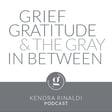
The Power of Parallel Paths: Navigating Radical Loss, Uncertainty, and Resilience with Rebecca Faye Smith Galli
Rebecca (Becky) Faye Smith Galli is an author, columnist, and advocate who writes about love,
loss and healing. Surviving significant losses—her seventeen-year-old brother’s death; her son’s
degenerative disease and subsequent death; her daughter’s autism; her divorce; and nine days later, her paralysis from transverse myelitis, a rare spinal cord inflammation that affects one in a million—has fostered an unexpected but prolific writing career. Her website (BeckyGalli.com) houses over 400 published columns. Her books, Rethinking Possible – A Memoir of Resilience (2017) and Morning Fuel – Daily Inspirations to Stretch Your Mind Before Starting Your Day(2024) reflect what she believes: “Life can be good—no matter what.” She continues to write Thoughtful Thursdays—Lessons from a Resilient Heart, a column for her subscriber family that shares what’s inspired her to stay positive.
Contact Rebecca Faye Smith Galli https://rebeccafayesmithgalli.com/
List of Topics:
• Author Introduction: Rebecca Faye Smith Gali (Becky) is introduced as an author, columnist, and advocate who writes about love, loss, and healing. Discussion includes her books: Rethinking Possible, a Memoir of Resilience and Morning Fuel, Daily Inspiration.
• Early Loss and Resilience: Discussing the death of her 17-year-old brother, Forrest, in a water skiing accident when Rebecca was 20, and observing the vastly different ways her parents grieved (one public, one private).
• The Power of Structure: How structure (like college classes) and avoiding isolation helped her move through initial grief, noting that resilience is a muscle that requires work and mindfulness.
• The Parallel Paths Concept: Learning about the powerful concept of pursuing parallel paths (e.g., hoping her son would outgrow seizures while also preparing for the reality that he might not) to manage the "immobility of uncertainty".
• Navigating Complex Family Dynamics: Discussing her son Matthew's epilepsy and subsequent death at age 15, raising her daughter Madison with autism, and consciously deciding to pursue an "amazing divorce" after three years of intensive counseling.
• Sudden Illness and Acceptance: Being paralyzed from the waist down by transverse myelitis and using the parallel paths concept in her health journey. She recounts her "big toe moment," realizing acceptance meant reinvesting the energy spent on hope into "living fully in the life I had".
• Three Tools for Navigating Grief: The essential strategies Rebecca uses: being honest about feelings (including anger and chronic disappointment), seeking resources (professional help, nature, support), and keeping moving by finding one small thing to be grateful for.
• The Importance of Perspective: The reminder that "life can be good no matter what".
• Avoiding Comparison: Using the analogy of the Dalmatian and the Chihuahua in the mud to illustrate that everyone's grief journey is different, and comparison should be avoided.
Contact Kendra Rinaldi for coaching or to be a guest on the podcast https://www.griefgratitudeandthegrayinbetween.com/


